People are increasingly becoming conscious of the daily sustainable choices they face, from where they purchase their food, to how they travel. Although their everyday habits might be reflective of their personal beliefs, the question is do their sustainable principles carry over into their investment decisions.
BHP in Australia recently announced plans to demerge its oil and gas subsidiary, despite concerns from some investors that the company will be exposed to higher risk from the lower level of business diversification. However, on the other hand, BHP has also been criticised in respect to its slow pace of advancing towards net zero emissions by 2050. While the decision to demerge has been welcomed by other investors as a step forward, the mixed reception to BHP’s demerger highlights conflicts in the business community around ethical investments, and heightened community concern about corporate social responsibility towards the environment and mitigating climate change.
What is Sustainable Investing? Sustainable investing directs investment capital to companies that seek to combat climate change and environmental destruction, while promoting corporate responsibility.
Calls for sustainable investing from individual investors have grown globally. According to the Schroders 2020 global sustainability survey of 23,000 investors across 32 locations, 25% of individual investors “always” ask about the sustainable aspects of investment products when they inquire about investment opportunities with financial advisors, and 40% “sometimes” ask about these aspects[1].
Figure1: Frequency that people ask for information on sustainable investing
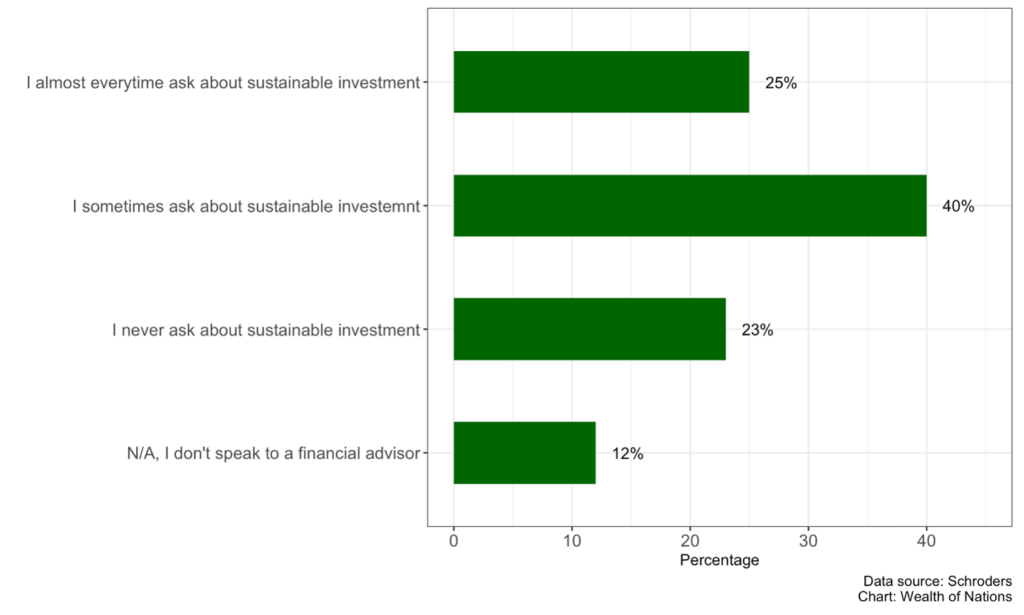
In the Schroders 2019 sustainability survey, responses varied for each generation, in response to the question, “Will you consider sustainability factors as the first or the second priority?”, 27% of Millennials (18-37), 23% of Generation X (38-50), 19% of Baby boomers (51-70) and 14% of older respondents (71+) answered “yes”[2].
Millennials and Generation X were the age groups that agreed the most with exercising social and environmental responsibility with investments. As Millennials and Generation X may be more likely to choose investment products and actively investigate different superannuation funds more than other age groups. Therefore, to attract Millennials and Generation X, investment managers and super funds need to consider increasing their offering in respect to sustainable investment products, and in particular, in impact investments
Figure 2: Ideas about sustainable investments for each generation
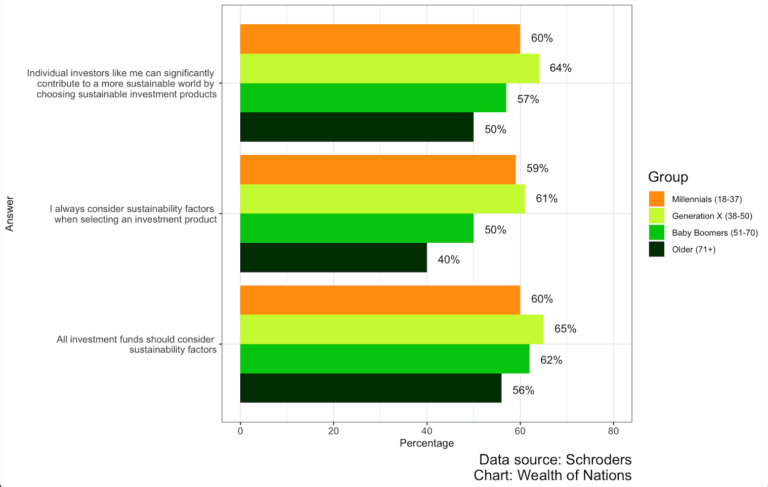
Similar to the case with BHP, most Australian companies and institutional investors now face social and environmental obligations demanded not just by the public, but by the government that represents them This has largely been driven by recent devastating weather events in Australia over the last few years from raging floods to devastating fires and biblical droughts across the nation, where at one point, all events taking place simultaneously across different states. The 2020 investment survey “charting consumer expectations and demand for responsible investing in Australia”, conducted by the Responsible Investment Association Australia (RIAA), found that from a group of 1135 respondents randomly selected from the general Australian population older than 18 years of age, 69% want to avoid investing in companies which negatively affect the environment. While 63% will not invest in animal testing-related companies, 61% want to avoid investing in tobacco and alcohol companies[3].
Considering that the majority of Australians wish to avoid investing in companies related to these industries, wholesale institutions, banks, and asset consultants continue to review their investment strategies. The RIAA also noted that 9 out of 10 (89%) Australians feel it’s important that their financial institutions invest responsibly and ethically across the board. Three-quarters of Australians would consider moving their banking and superannuation or other investments to other providers if they found out their current provider was investing in companies that are not aligned with their values. Additionally, 67% of Australians who do not currently invest in ethical companies, funds, or superannuation are likely to do so in the next 5 years with 32% saying they would consider doing so in the next year.
At a glance, there is an increasing impetus demanding sustainable investing on all fronts. With
80% stated that environmental issues are an important factor to consider, and 64% agreed that social problems should be considered when it comes to investing. The top themes are renewable energy (55%), sustainable water management and use (48%), healthcare and medical products (48%), healthy rivers and ocean ecosystems (45%), sustainable land and agriculture management (43%), and education (42%) respectively[4].
Considering that consumers increasingly want to determine their investment products or choose their superannuation funds, institutional investors now should take heed of these consumer preferences when deciding on investment strategies A caveat to all those managing money on behalf of the ‘conscious generation’, ensure your sustainable products deliver measurable social and environment impact.
In response to public demand, the proportion of sustainable investment in the financial market has been growing. In Australia, responsible investments in assets under management (AUM) have been increasing from AUD 980 billion in 2018 to AUD 1,281 billion in 2020. In terms of proportion of market AUM, 31% was in responsible investments in 2019, jumping to 40% in 2020[5].
Figure 3: Responsible Investment AUM compared to the remainder of the market in Australia 2018–2020 ($ billions)
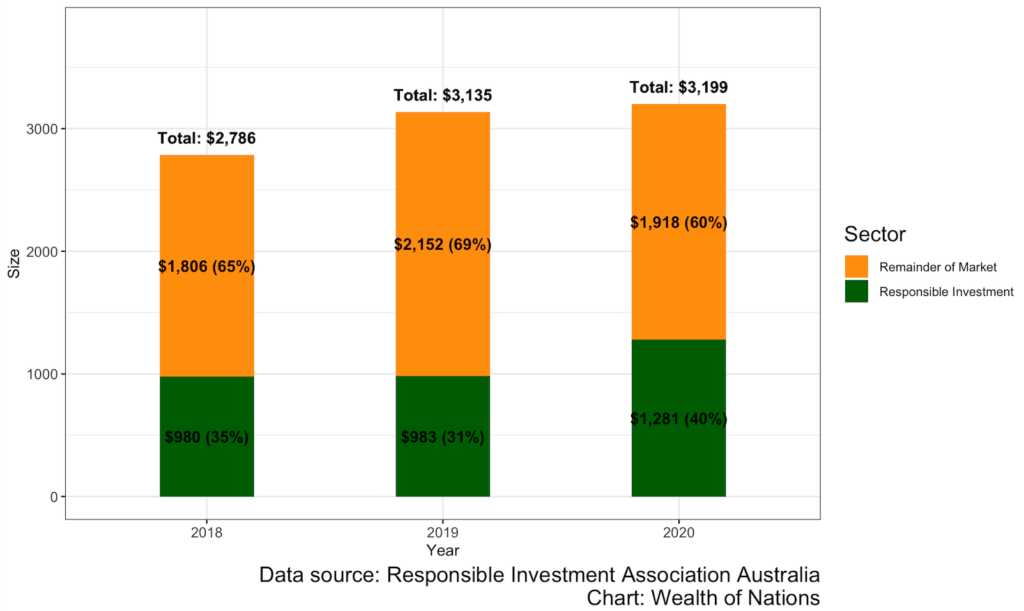
Companies are also facing up to the challenge and increasingly focusing. According to KPMG, about 98% of ASX100 companies now provide sustainability reports to the public. Globally, 100 companies with the greatest revenue across 52 countries (N100), and the largest 250 companies internationally (G250), have emphasised sustainable reporting[6]. These growing trajectories of sustainable investment reporting can be considered a reflection of high demand from investors, and some financial markets adapting to its needs.
Figure 4: Growth in global sustainability reporting rates since 1993: N100 and G250
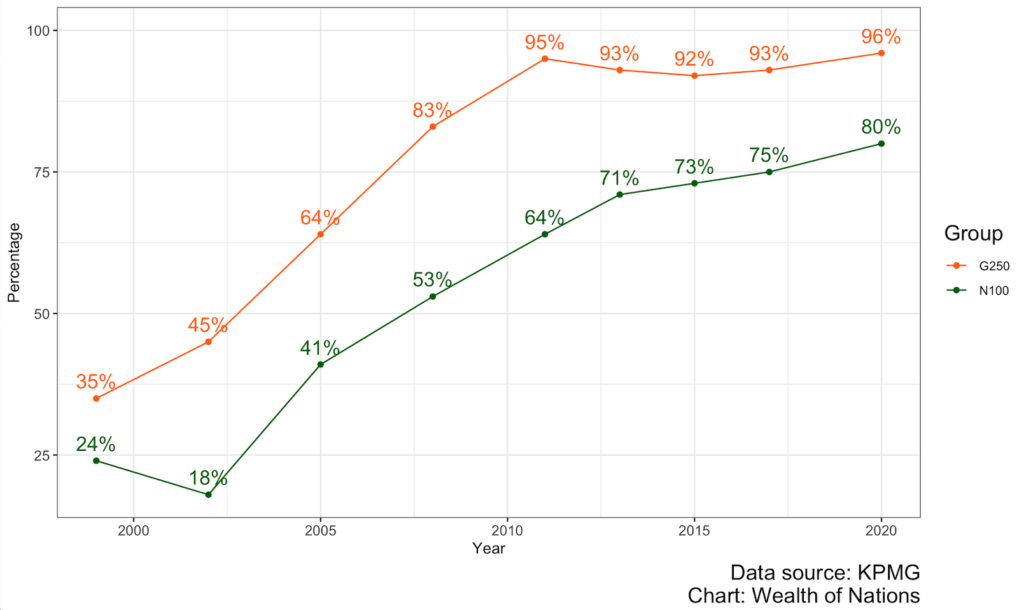
Financial markets are changing as a growing majority of investors now seek sustainability in their investments, and the market has been adapting to fulfill some of the needs of clients, yet are the investment options keeping up with the actual demand for them?
With 77% of people would not willing to invest against their personal beliefs, the investment industry could be doing more to satisfy investor appetite for sustainable investments by also having financial advisors pro-actively providing their clients with sustainable investment options and information as 45% of people say they only receive information on sustainable investing if they prompt their financial advisor[7].
Figure 5. “The investment industry could be doing more to satisfy investors’ appetite for sustainable investments.
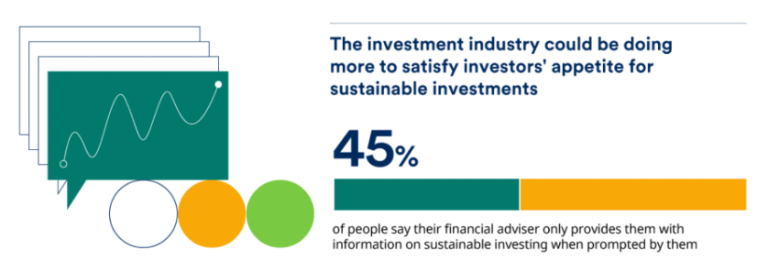
Money is fluid and humans move in herds, there is more action being taken from Gen X’s to Millennials to the recently entering Gen Z’s they have made their investment intensions clear and are demanding that their investments are driven by intentionality towards sustainable and ethical investing practices that also have the ability to provide a good financial return. These cohorts are willing to shift their investments towards sustainable impact investing and 67% are most likely to do so in the next 5 years (RIAA)[8].
Investing in positive impact could in fact lift Australian savings rates with 53% saying that they would be motivated to invest and save more money if they knew their savings or investment made a positive difference in the world[9].
To finish, a quote from Adam Smith should be headed, as after all he did not only write Wealth of Nations for which he best known for, he also wrote a classic, ‘The Theory of Moral Sentiment’
“A nation is not made wealthy by the childish accumulation of shiny metals, but is enriched by the economic prosperity of its people”
Adam Smith
Wholesale institutional investors, banks, and asset consultants or all financial services must look to actively incorporate the impact investing needs of clients and not merely at ESG or SRI level which are risk mitigation tools or outdated aspects of positive impact measurements tools respectively. To better serve current and future generational client’s, superannuation’s and banks must seek to communicate the impact (positive/negative) to their consumers and disclose and be transparent in how the companies that are invested in aligning to their personal beliefs and the needs of the wider social and environmental demand of the country and the world. As in the end, “IMPACT” is never a local issue, it is a global one.
[1] Schroders, Sustainability survey, 2020, https://www.schroders.com/en/insights/global-investor-study/2020-findings/sustainability/
[2] Schroders, Sustainability survey, 2019, https://www.schroders.com/en/au/advisers/insights/global-investor-study/2019-findings/sustainability/
[3] Responsible Investment Association Australia, Charting consumer expectations and demand for responsible investing in Australia, 2020, https://responsibleinvestment.org/wp-content/uploads/2020/03/From-Values-to-Riches-2020-full-report.pdf
[4] Responsible Investment Association Australia, Charting consumer expectations and demand for responsible investing in Australia, 2020, https://responsibleinvestment.org/wp-content/uploads/2020/03/From-Values-to-Riches-2020-full-report.pdf
[5] Responsible Investment Benchmark Report Australia, Responsible Investment Association Australia, 2021,
https://responsibleinvestment.org/resources/benchmark-report/
[6] KPMG, Survey of Sustainability Reporting, 2020, https://home.kpmg/xx/en/home/insights/2020/11/the-time-has-come-survey-of-sustainability-reporting.html
[7] BlackRock, Global Sustainable Investing Survey, 2020,
https://www.blackrock.com/corporate/about-us/blackrock-sustainability-survey
[1] Schroders, Sustainability survey, 2020, https://www.schroders.com/en/insights/global-investor-study/2020-findings/sustainability/
[2] Schroders, Sustainability survey, 2019, https://www.schroders.com/en/au/advisers/insights/global-investor-study/2019-findings/sustainability/
[3] Responsible Investment Association Australia, Charting consumer expectations and demand for responsible investing in Australia, 2020, https://responsibleinvestment.org/wp-content/uploads/2020/03/From-Values-to-Riches-2020-full-report.pdf
[4] Responsible Investment Association Australia, “Charting consumer expectations and demand for responsible investing in Australia”, 2020, https://responsibleinvestment.org/wp-content/uploads/2020/03/From-Values-to-Riches-2020-full-report.pdf
[5] Responsible Investment Benchmark Report Australia, Responsible Investment Association Australia, 2021, https://responsibleinvestment.org/resources/benchmark-report/
[6] KPMG, Survey of Sustainability Reporting, 2020, https://home.kpmg/xx/en/home/insights/2020/11/the-time-has-come-survey-of-sustainability-reporting.html
[7] Schroders, Sustainability survey, 2020, https://www.schroders.com/en/insights/global-investor-study/2020-findings/sustainability/
[8] https://responsibleinvestment.org/wp-content/uploads/2020/03/From-Values-to-Riches-2020-full-report.pdf
[9] Same as above









